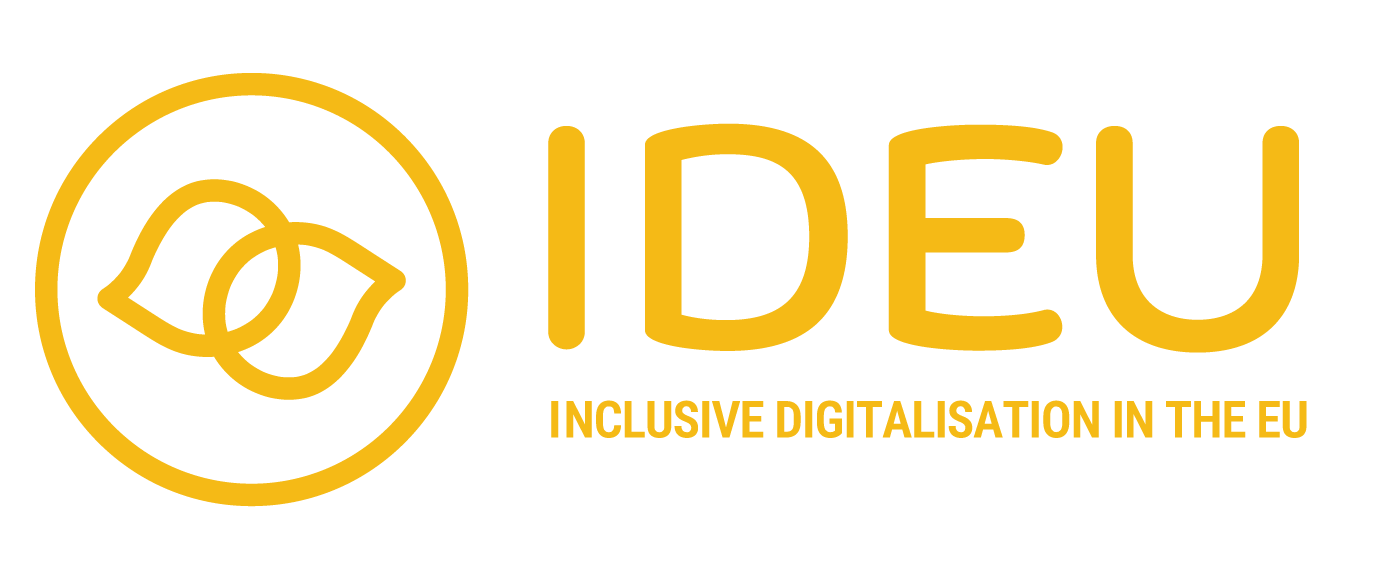
We contribute to a more open and participatory Europe through crowdsourcing
Through the “Inclusive Digitization in the EU (IDEU)” project, we have one main goal: Enabling citizens to shape the future of Europe’s digital transformation. A future that “leaves no one behind”.
To achieve that, seven organizations from different European countries collaborate and seek citizens’ opinions, suggestions, and concerns through a participatory crowdsourcing process. The participating countries – Spain, Germany, Belgium, Croatia, Bulgaria, and Romania – were chosen for their historical, economic, and digital diversity.
Through the “Inclusive Digitization in the EU (IDEU)” project, more than 2,300 citizens from these countries will express their opinions on European Union policies regarding digital transformation.
Our main goals are:
- Helping citizens understand how EU policies are shaped and how they can participate in decision-making.
- Enabling citizens to propose solutions for the transition to the digital age, influencing policy-making processes at a local, national, and European level.
- Increasing knowledge about crowdsourcing, a method that can make democracy more open and participatory, leveraging technology for citizen input into decision-making processes.
With the “Inclusive Digitization in the EU (IDEU)” project, we bring citizens to the forefront and contribute to a more democratic and fair digital transformation for all.
Funding

The “Inclusive Digitization in the EU (IDEU)” project project is co-funded by the European Commission, Citizens, Equality, Rights and Values (CERV) programme (Grant Number 101147200)
Funded by the European Union. Views and opinions expressed are however those of the author(s) only and do not necessarily reflect those of the European Union or the European Education and Culture Executive Agency (EACEA). Neither the European Union nor the EACEA can be held responsible for them.

We contribute to a more open and participatory Europe through crowdsourcing
The digital divide in the EU is widening, particularly affecting women, people with disabilities, low-income groups, and the elderly population.
The countries involved in the project show varying levels of digital progress, highlighting the need for specific solutions relevant to local circumstances. For example, while Spain ranks high in digitalization (7th place), Bulgaria and Romania lag behind (26th and 27th place). Furthermore, gender inequalities in digital skills persist in all six countries.
With the “Inclusive Digitalisation in the EU (IDEU)” project, we address these challenges by:
- Raising stakeholders’ awareness of digital transformation policies and expectations at a European, national, and local level.
- Providing citizens with a platform to co-shape inclusive digital policies.
- Ensuring diversity, equality, inclusion, and accessibility in digital policymaking.
- Strengthening local partnerships with policymaker bodies to create institutions for participatory decision-making.
- Supporting the integration of citizen-driven proposals into the EU’s digital transformation agenda.

We contribute to a more open and participatory Europe through crowdsourcing
The project is in its first phase of implementation, and the Crowdsourcing platform has already been completed to allow citizens to speak.
Visit the website: https://crowdsourcing.ecas.org/en
The expected results of the project are:
- Citizen participation: Crowdsource opinions from six countries on digital transformation priorities.
- Policy impact: Develop and present recommendations to local and national decision-makers to ensure digital inclusion.
- Awareness-building: Αwareness-raising campaigns to educate the public and stakeholders on digital policies.
- Monitoring framework: Create a citizen-driven framework for tracking digital transformation progress at local and national levels.
- Institutional engagement: Establish sustainable collaborations with local authorities, demonstrating the value of crowdsourcing in policymaking.
- Best practice sharing: Organization of events and online training modules to disseminate knowledge about crowdsourcing and policy making.
- Strengthening citizen participation: Empowering EU stakeholders in digital participation, encouraging innovation in policy-making with citizens at the center.



